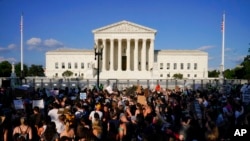An investigative report released Thursday failed to identify who was behind the May 2022 leak of a draft version of the U.S. Supreme Court's ruling that overturned the 1973 Roe v. Wade decision on abortion rights, and it criticized the security measures of the nation's top judicial body.
The report detailed an eight-month investigation conducted by Supreme Court Marshal Gail Curley at the direction of Chief Justice John Roberts. The leak – with the news outlet Politico publishing the draft ruling on May 2 – prompted an internal crisis at the court and ignited a political firestorm, with abortion rights supporters staging rallies outside the courthouse and at various locations around the United States.
It was an unprecedented violation of the nine-member court's tradition of confidentiality in the behind-the-scenes process of making rulings after hearing oral arguments in cases.
The report did not identify a specific source of the leak, noting that none of the 97 court employees interviewed by investigators confessed to the disclosure.
Risky court environment seen
It was critical of some of the court's internal security protocols, and it made clear that investigators would continue to pursue any new leads. If a court employee was responsible, the report said, that person "brazenly violated a system that was built fundamentally on trust with limited safeguards to regulate and constrain access to very sensitive information."
"The pandemic and resulting expansion of the ability to work from home, as well as gaps in the court's security policies, created an environment where it was too easy to remove sensitive information from the building and the court's [information technology] networks, increasing the risk of both deliberate and accidental disclosures of court-sensitive information," the report said.
The report recommended that regardless of whether the source is identified, the court should "create and implement better policies to govern the handling of court-sensitive information and determine the best IT systems for security and collaboration."
The leak investigation was conducted at a time of increased scrutiny of the court and concerns about an erosion of its legitimacy, with opinion polls showing dropping public confidence in the institution. Only 43% of Americans have a favorable view of the court, according to a Reuters/Ipsos poll conducted January 13-15, down from 50% last May.
In examining the court's computer devices, networks, printers and available call and text logs, investigators found no forensic evidence indicating who disclosed the draft opinion, the report said.
"In time, continued investigation and analysis may produce additional leads that could identify the source of the disclosure," the report stated.
The draft opinion, authored by Justice Samuel Alito, was only marginally different than the final decision issued on June 24. The ruling upheld a Mississippi law banning abortions after 15 weeks of pregnancy and ended the recognition of a woman's right to an abortion under the U.S. Constitution.
Several Republican-governed states moved rapidly after the ruling to enact abortion bans.
'An affront'
Roberts, the day after the publication of the leaked opinion, announced an investigation into what he called "a singular and egregious breach" of the Supreme Court's trust "that is an affront to the court and the community of public servants who work here."
Roberts, in announcing the investigation, defended the court's workforce as "intensely loyal to the institution and dedicated to the rule of law," adding that court employees have a tradition of respecting the confidentiality of the judicial process.
Protesters gathered outside the homes of some justices after the leak. A 26-year-old California man armed with a handgun who expressed his intention to kill Justice Brett Kavanaugh was charged with attempted murder on June 8 after being arrested near Kavanaugh's Maryland home.
Justice Elena Kagan in September said the court's legitimacy could be imperiled if Americans come to view its members as trying to impose personal preferences on society. In October, Alito warned against questioning the court's integrity.
Justice Sonia Sotomayor on January 4 said she felt a "sense of despair" at the direction taken by the court during its previous term. The court has a 6-3 conservative majority.
Alito found himself in the middle of another leak controversy in November after The New York Times reported a former anti-abortion leader's assertion that he was told in advance about how the court would rule in a major 2014 case involving insurance coverage for women's birth control.
The ruling, authored by Alito, exempted privately held companies from a Democratic-backed federal regulation that would have required any health insurance they provided employees to cover contraceptives if the business expressed a religious objection.
Alito said that any allegation that he or his wife leaked the 2014 decision was "completely false." The court's legal counsel concluded "there is nothing to suggest" Alito violated ethical standards.






